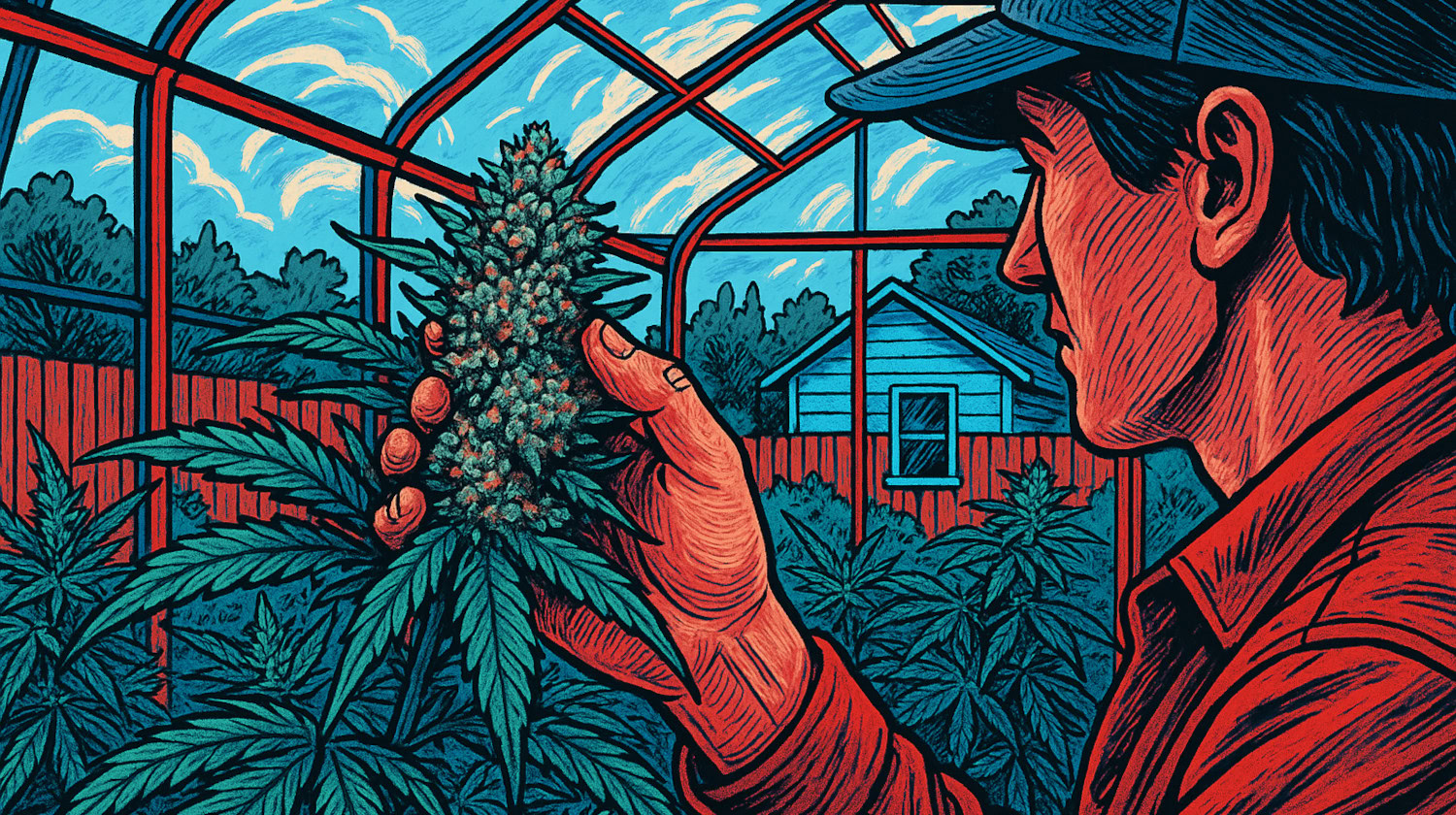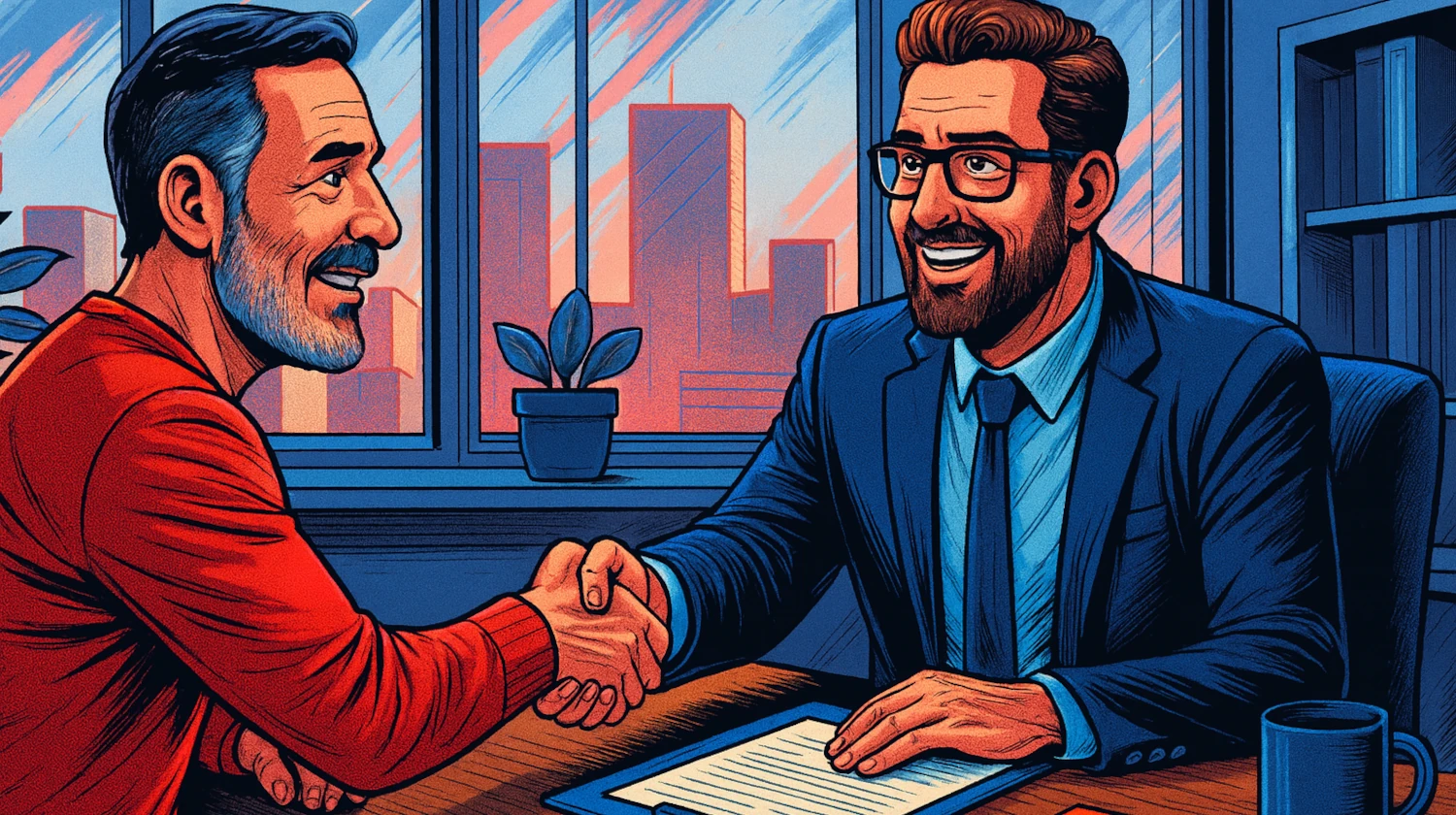In This Article
- Do you lose your gun rights if you have a medical card?
- What is question 21f in ATF Form 4473?
- What happens to my existing gun collection if I get an MMJ card?
- Are there any states that allow firearm ownership with a MMJ card?
- Can you own a gun after your medical card expires?
- What happens if I am forced to use a gun in a self-defense scenario?
- Can you hunt if you have a medical card?
- What about those who work in the cannabis industry?
The subject of weed and guns is triggering debate across the nation. With 42% of U.S. households having at least one gun in their possession in 2023 and the number of U.S. cannabis consumers on target to reach 71 million by 2030, many people's minds are shooting blanks in regards to whether or not they must substitute one for the other.
Statistics indicate that 40% of men and 25% of women claim to own a gun. Among those who own a firearm in the U.S., 47% are adults residing in rural areas, 30% live in suburbs, and 20% in urban areas. According to the Second Amendment of the United States Constitution, "A well-regulated Militia, being necessary to the security of a free State, the right of the people to keep and bear Arms, shall not be infringed."
So, does this mean that people who consume medical or recreational cannabis — a substance that remains illegal at the federal level — must relinquish firearms ownership?
Can you hunt if you have a medical card? Can you own a gun after your medical card expires? The questions swirl around this complex issue. We spoke with Jeffrey S. Gard of Gard Law Firm, LLC in Boulder, Colorado – an experienced attorney in criminal defense and cannabis/hemp matters.
Do you lose your gun rights if you have a medical card?
Federal law stipulates that it is illegal for cannabis consumers to possess a firearm. This rule stems from the legality of cannabis, which falls under the Schedule I classification of the Controlled Substances Act (CSA). The law also prohibits users of other Schedule I drugs, such as crack cocaine, heroin, and LSD, from possessing guns.
The Bureau of Alcohol, Tobacco, Firearms, and Explosives (ATF) deems a cannabis user — regardless of the plant's legal status in the consumer's respective state — an "unlawful user" of a controlled substance, meaning that they are not legally allowed to own a firearm.
"It is all guided by the federal government. The Brady Handgun Violence Prevention Act prohibits the sale of firearms to the users of illegal drugs, including marijuana. The ATF authored an open letter that states anyone who has a medical marijuana card is prohibited from purchasing or owning a firearm," says Gard, elucidating one of the downsides of being an MMJ cardholder.
So, do you lose your gun rights if you have a medical card?
Cannabis is subject to strict regulation; therefore, federal law does not acknowledge recreational use, nor does it recognize medical cannabis cards. As a criminalized and prohibited substance, federal law also disregards medical cannabis programs. The ATF website attributes this to the Food and Drug Administration's (FDA) views on cannabis as a substance with high abuse potential.
According to Gard, "The only way for any user of marijuana to purchase a firearm is to falsify the ATF form. This went up to the 9th circuit at one point. They said unless you change the CSA or you exempt certain users, the courts aren't going to intervene."
"There's been a long trend of non-enforcement, so if you're a medical marijuana user and you have a firearm in the house, they aren't likely to prosecute you for falsifying that form unless you're doing something bad with the gun. And if you are doing something wrong with a gun, you're likely to be prosecuted for something else, not falsifying that ATF form," notes Gard.
Per the federal Gun Control Act of 1968, unlawful users or people with an addiction to controlled substances cannot legally ship, transport, receive, or possess firearms or ammunition. In Minnesota, for example, federal law defines current cannabis consumers as "unlawful users," even though recreational use became legal on August 1, 2023. Consequently, consumers are legally forbidden to possess, receive, ship, or transport ammunition or firearms.

What is question 21f in ATF Form 4473?
Firearms Transaction Record, better known as "ATF Form 4473," is a seven-page form established by the ATF division of the Department of Justice (DOJ). The purpose of this form is to determine whether or not someone is disqualified from owning a firearm by either state or federal law. Federal law forbids using both; thus, individuals intending to purchase a firearm from a Federal Firearms License (FFL) holder must complete the form with the utmost transparency.
Gun dealers, or FFL licensees, require all individuals identified in Section B — which includes the purchaser's name, address, and physical features (e.g., height, weight, race, and sex) — to complete Form 4473 for consideration to buy or to receive firearm delivery. Form 4473 outlines specific restrictions on the possession and receipt of firearms.
What is question 21f in ATF Form 4473?
Question 21f in ATF Form 4473 reads as follows: "Are you an unlawful user of, or addicted to, marijuana or any depressant, stimulant, narcotic drug, or any other controlled substance? Warning: The use or possession of marijuana remains unlawful under Federal law regardless of whether it has been legalized or decriminalized for medicinal or recreational purposes in the state where you reside.”
"That's the question that asks if you're a user of cannabis. Nothing about state legality lets you answer 'no' on that form. If you answer 'no' on that form as a cannabis consumer, you have falsified the form and lied to the federal government," explains Gard.
Gun owners who admit to using cannabis risk facing severe legal repercussions, such as deprivation of their right to possess firearms. Laws relating to weed and guns are generally the same in most states since the rules are governed by federal law.
What happens to my existing gun collection if I get an MMJ card?
Like many other legal issues, the answer to this question depends on numerous federal and state laws, not the gun owner's specific circumstances. Legally, from a federal perspective, MMJ cardholders must forgo gun ownership and those who do not face a big legal risk.
Conversely, Gard advises that the federal government is unlikely to arrest you for an existing gun collection if you get an MMJ card because "It's about the purchase of a firearm, not the possession of a firearm; the laws about the Brady Act are designed to prohibit the sale of a firearm, but not the inheritance or gifting of one."

Are there any states that allow firearm ownership with a MMJ card?
Simply put, weed and guns don't make a good duo in the eyes of the federal government. The motive of this legal decision reverts to cannabis' Schedule 1 status as a controlled substance. Ergo, a state allowing firearm ownership with an MMJ card is technically illegal, and it’s unlikely that state firearms protection will be considered enforceable.
Does it matter in the eyes of the ATF?
You may lose the right to possess a firearm if you answer "yes" on ATF Form 4473 question 11f, which asks, "Are you an unlawful user of, or addicted to, marijuana or any depressant, stimulant, narcotic drug, or any other controlled substance?"
Currently, the ATF cannot retrieve a state's MMJ card information, but MMJ cardholders commit perjury if they untruthfully say "no" to using cannabis on ATF Form 4473, question 11f.
Are the consequences with the federal government the same?
"No, because they are all governed by the Brady Act and federal law. There is no law, even federally, that says a medical marijuana user cannot own a firearm. They say that you can't purchase a firearm," says Gard, likening it to banking. "It always starts, ends, and finishes with the federal government's dictates. Concealed carry is on a state-by-state basis, and they do ask about your use of a controlled substance."
Gard emphasizes the risk of facing time behind bars for people who possess a firearm near an area involving illegal cannabis activities, such as if you have a black market grow or you sell mushrooms. In Colorado, for example, this may land you a 12-year mandatory prison sentence.
"It's complicated to have a home grow that only grows within the state limit. And if you don't dispose of the weed trash, it can add up to over the limit. So, if police were to find the gun near several pounds of cannabis waste, it could result in charges. That's a state law."
Can you own a gun after your medical card expires?
Depending on the state in which you reside, medical cannabis cards expire on an annual, biennial, or triennial basis. Failure to renew or reapply means losing access to the benefits of your state's MMJ program.
So, does this mean that you can own a gun after your medical card expires?
"Yes, you can own a gun with a medical card. But if you lie on the ATF form, you'll have lied to the federal government. Now, they have other things to do than worry about medical marijuana users checking no on that box. There's nobody doing anything about it, but if you acquired that through false pretenses, it's unlawful," says Gard.
Do you need to notify any government agency?
No, you just need to complete form 4473. The rule permitting gun purchases and ownership typically applies in any state if your medical card is expired and you are not using medical cannabis. Form 4473 applies to every state with legal MMJ programs, but each state's gun laws and requirements may vary by state.

What happens if I am forced to use a gun in a self-defense scenario?
Restricting gun ownership limits a person's right to self-defense per the 2nd Amendment. The existing legal state of affairs compromises the constitutional rights of Americans, hence jeopardizing the health and safety of millions of countrywide medical cannabis users. That said, MMJ users are starved of their freedom to use their prescribed medicine without surrendering their Second Amendment rights.
So, can my spouse have a gun if I have a medical card?
"Yes, your spouse can own a gun. The lawful ownership of the gun is not a consideration. But if you're committing illegal behavior, the rule is that the defendant used, displayed, possessed, or had within his or her immediate reach. In that case, it is about possession, not firearm ownership," says Gard.
Firearm holders must secure their guns as necessary if the spouse has a medical card. Should someone feel compelled to use their weapon in a self-defense scenario, MMJ use does not come into play. As Gard explains, these are called the "stand your ground or make my day affirmative defenses."
"If you have a reasonable belief that you are in imminent danger of death, you are allowed to use force in self-defense. There is nothing about being a medical marijuana cardholder or having a little pot in the house that's going to feed into that analysis," continues the attorney, noting that the self-defense argument would be evaluated in the context of whether what you did was reasonable.
Conversely, "If someone comes into your house to steal marijuana from your small-time illegal grow, that's a different issue. So you may not go down for the homicide, but you may go down for the grow and the weapon."
Can you hunt if you have a medical card?
As of 2023, over 13 million people actively participate in hunting activities across the U.S. Hunting licenses are regulated by the U.S. Fish and Wildlife Service (FWS) and are available in the state you are hunting in, but national wildlife refuges may supply special permits.
This leaves many to wonder: Can you hunt if you have a medical card?
Medical cannabis use does not restrict anyone from obtaining a hunting license. However, the Fish and Game Code (FGC) does not allow people to hunt under the influence (refer to FGC, section 3001) due to obvious safety hazards.
Does the federal firearm law apply to other weapons, such as bow hunting and antique guns?
"Bows and crossbows aren't a problem. You can have all the bows, crossbows, and air rifles you want," affirms Jeffrey S. Gard of Gard Law Firm, LLC.
His advice is shared by Captain Patrick Foy of the California Department of Fish and Wildlife (CDFW), who confirms that fish and wildlife laws don't prohibit MMJ cardholders from procuring a hunting license. Regulations also exist regarding the use and possession of cannabis on CDFW territories, including people in possession of the plant for medical purposes (refer to California Code of Regulations Title 14, section 550(x)(2))."

What about those who work in the cannabis industry?
Can you own a gun if you work at a dispensary or have a cannabis-related profession?
Industry analysts foresee the U.S. cannabis industry harvesting $40 billion in 2024. Brick-and-mortar dispensaries generate most of this revenue, with farmers planting seeds that had germinated almost half a million full-time jobs (428,059) at the beginning of 2022. Considering the normality of nationwide gun ownership, dispensary workers need to understand if they can own a firearm.
So, can you own a gun if you work at a dispensary?
The subject hovers in a gray area; the ATF Form 4473 prohibits cannabis users from purchasing a firearm unless the plant is legalized at the federal level. In some states, like California, counties can require dispensaries to hire armed guards, thus making them employees working in the cannabis industry.
"It's not about owning a firearm, but how you obtained it. The laws prohibiting marijuana users from purchasing firearms do not extend to possessing firearms unless you're doing something illegal with that cannabis or firearm," explains Gard, suggesting that the consequences are not the same for employees who don’t use cannabis or are in non-plant-touching roles.
Despite the complexities surrounding the subject of weed and guns, a recent federal appeals court ruling sparked a string of efforts to expand gun rights, which are ongoing. In 2023, congressional lawmakers introduced H.R. 363: The Second Amendment Protection Act (January 13, 2023) and H.R. 2772: The GRAM Act (April 20, 2023).
Lawmakers put forth the acts in a bid to eliminate federal firearms-related restrictions on cannabis-consuming individuals. Months later, on Wednesday, August 9, 2023, a federal appeals court ruled that a decades-old law barring illegal drug users from owning firearms was unconstitutional based on the case of a cannabis user. A three-judge panel of the 5th U.S. Circuit Court of Appeals in New Orleans settled that federal law violated a Mississippi man's right to "keep and bear arms" in virtue of the U.S. Constitution's Second Amendment.
The information in this article and any included images or charts are for educational purposes only. This information is neither a substitute for, nor does it replace, professional legal advice or medical advice, diagnosis, or treatment. If you have any concerns or questions about laws, regulations, or your health, you should always consult with an attorney, physician or other licensed professional.




